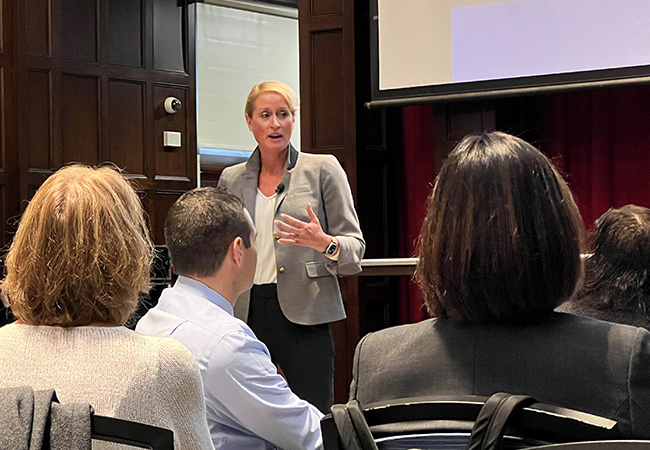Superintendents discussed ways to avoid burnout at first in-person Study Councils meeting since the pandemic began

Dr. Kandi Wiens led a program on preventing burnout for dozens of superintendents of regional school districts at the first in-person Penn School Study Councils meeting since 2019. It’s a topic that is top of mind as educational leaders face multiple crises: teachers, principals and staff are leaving in droves, parents are divided about what they want, and students are not performing well on standardized tests.
Wiens' workshop on December 7, 2022 offered the leaders strategies for using emotional intelligence to take care of themselves and their communities. As a senior fellow in Penn GSE’s Teaching, Learning and Leadership Division, she studies leaders in high-stress jobs, like police chiefs and chief medical officers. Educators now fall into that category as well, she explained.
“As you can imagine, police chiefs are in a role where it's very difficult for them to share their experiences with other people, including sometimes their spouses or their family members, sometimes because of the legality of what information they can or cannot share, but also sometimes because they just don't want to,” Wiens said. “They live in their stress all day, all night long. They tell me that it is quite a lonely experience. They find support in each other (just as the superintendents do in Penn study council meetings).”
Burnout is not just being under stress or feeling tired. Burnout is a loss of professional effectiveness accompanied by cynicism and emotional exhaustion. Some people are more vulnerable to burnout due to external factors, like life stressors, and others because of internal factors, such as a job and temperament mismatch.
Those who avoided burnout were engaged with their stakeholders, remained in touch with why they do the work, and cared for their own emotional needs. So, she developed a strategy to navigate the pitfalls that lead to burnout, summing it up as ARMOR: Awareness, Regulation (of emotions, thoughts, and behaviors), Meaningful connections, Outlook, Recover, Reconnect, and Reimagine.
The most important tip Wiens offered for avoiding burnout is to take care of your physical, emotional and social needs. Spend time with family, friends, and peers. Take a vacation. Don’t be afraid to trim back expectations to pre-pandemic levels. And never, ever forget your “why.”
